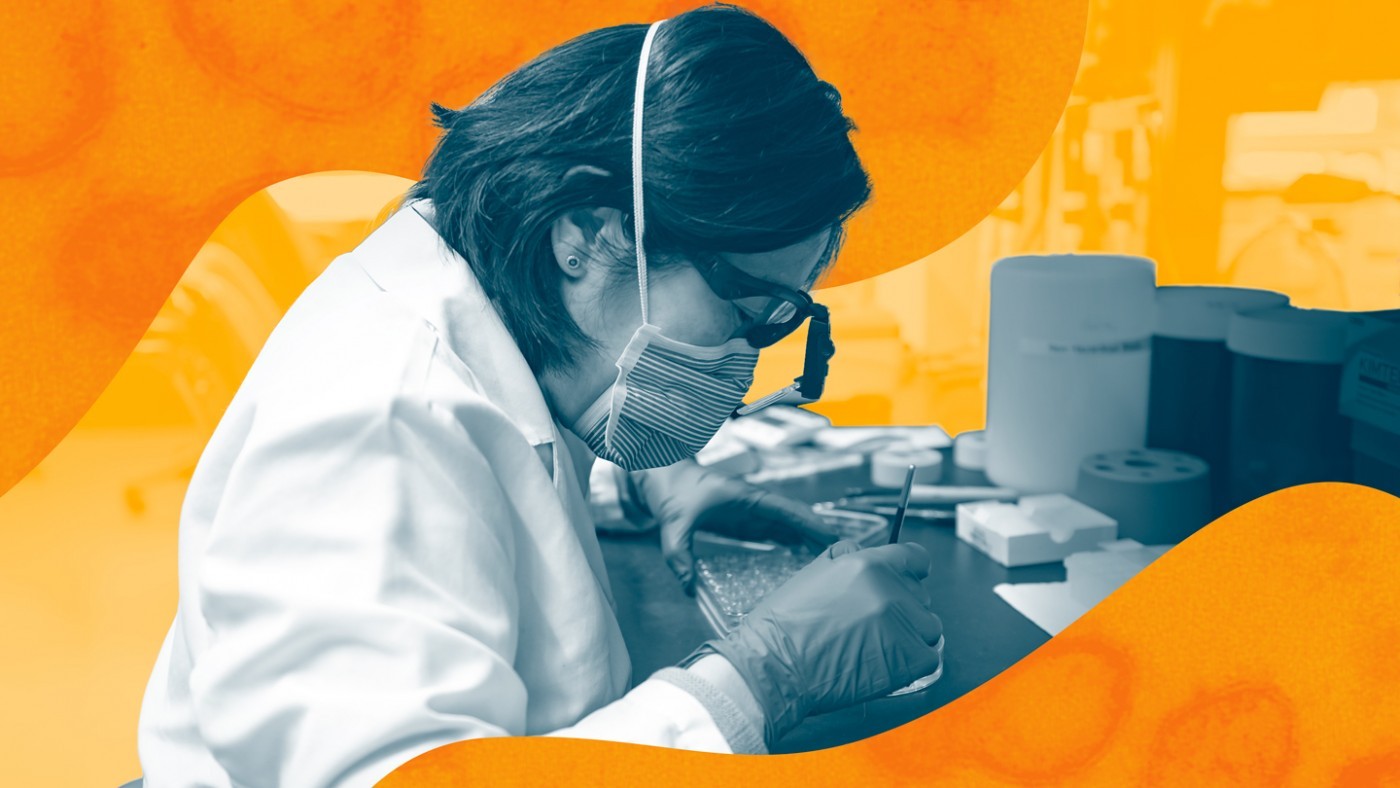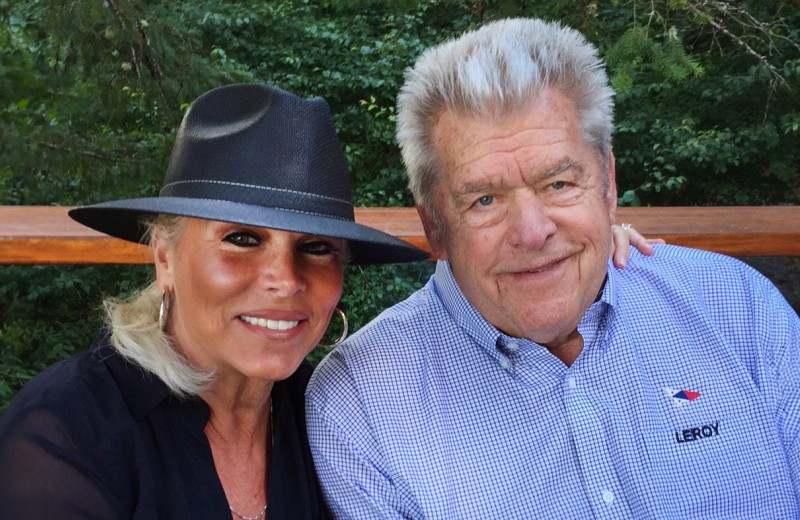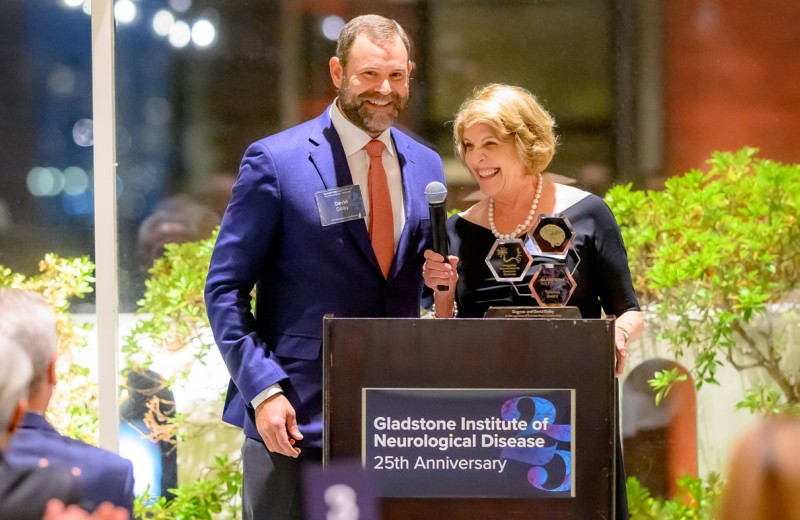Gladstone NOW: The Campaign Join Us on the Journey✕

The Gladstone President’s Coronavirus Research Fund seeds new urgent experiments to solve COVID-19 and allows scientists to pivot existing projects to address pressing questions about the emerging coronavirus.
“The current coronavirus pandemic is an important world health issue that needs our immediate attention, and I believe the best way we can help is by supporting scientific medical research,” says Attorney Sharon Winslow.
She and her husband, Clark, are among the numerous people who made a donation to Gladstone Institutes to help scientists unravel the mechanisms of COVID-19.
“We’re so grateful that Gladstone has been able to shift much of its work to focus on combatting the devastating consequences of this virus,” says Winslow, who is also a Gladstone Foundation board member. “We’ve been supporting Gladstone for several years now, and we continue to be impressed with their ability to do cutting-edge, yet truly useful research that can make a difference in our lives.”
The Winslows have another—and more personal—reason for their latest gift. Their 28-year-old son was recently hospitalized in Madrid, Spain, when he tested positive for COVID-19.
“That really got our attention,” she says. “Our son was lucky because he was early in the curve, received fantastic health care, and has been out of the hospital for a few weeks now. But seeing how sick he got made us realize that this virus can affect anyone; it can be very dangerous for the young and healthy too.”
Winslow’s donation is supporting the President’s Coronavirus Research Fund at Gladstone, which seeds new urgent experiments to solve COVID-19 and allows scientists to pivot existing projects to address pressing questions about the emerging coronavirus. Other donors have also felt compelled to fund this critical research since the pandemic began.
“In addition to supporting people in the current crisis, it’s important to invest simultaneously in a solution,” says Kent Thiry, philanthropist and executive chairman of the board of directors at DaVita Inc. “Given their exceptional track record, I believe research at Gladstone has the opportunity to make discoveries of great magnitude. Particularly in today’s world where boundaries between so many of the sciences are blurring, I think Gladstone’s flexibility gives it a competitive advantage over most comparable institutions.”
Since the outbreak of the COVID-19 crisis, Gladstone’s experts in virology, stem cell research, chemistry, proteomics, gene editing, and artificial intelligence have rapidly joined forces to tackle the virus by developing improved diagnostics, identifying treatment strategies, and finding preventative approaches.
This requires more than funds. Much like front-line health care workers, scientists also need special protective equipment to reduce the transmission of COVID-19, especially when handling the live virus and patient samples.
“I hope this crisis will call attention to the fact that scientific research has a crucial role to play in terms of prevention, possible treatments, and vaccination.”
In response to this increased need for safety precautions, local and international individuals and organizations have donated personal protective equipment to Gladstone, including KN95 masks, medical masks, goggles, and gloves.
“We’ve gone through the most trying time of the COVID-19 outbreak in China and we’re still facing challenges in resuming a normal life,” says Manchun Lu, chief operating officer of Global Health Drug Discovery Institute in Beijing, China. “Along with our partners at Tsinghua University, we donated protective equipment to provide some help to our friends at Gladstone in this difficult moment. After all, we are one research community when fighting this pandemic disease. I think we are all doing what we should do.”
Here in California, Samuel Tiu and his wife, Julia, donated surgical masks for biosafety level 2 labs, supporting Gladstone’s efforts to find antivirals and a vaccine for SARS-CoV-2, the virus that causes COVID-19.
“Gladstone’s work on the vaccine is part of our long-term war against this virus, and we are very happy to be able to help in our small way,” says Tiu.
In any form, donations are necessary to jump-start scientific research until traditional forms of funding can intervene.
“We are grateful for the outpouring of generosity during this global crisis, which is allowing us to concentrate our resources on ending the pandemic as soon as possible and strengthening our efforts to prevent future pandemics,” says Gladstone virologist Warner Greene, MD, PhD.
Winslow agrees. Although according to her, it’s important to support science all the time.
“After SARS, MERS, and Ebola, I don’t think this pandemic was a surprise to the scientific community—and I don't think it will be the last one,” she says. “With the population density and ease of international travel, viruses like this one will become more and more common.”
“I hope this crisis will call attention to the fact that scientific research has a crucial role to play in terms of prevention, possible treatments, and vaccination,” she adds. “I think it’s our best option for improving the human condition, and that’s why we should all support it.”
Support Our COVID-19 Research Efforts
Gladstone scientists are moving quickly to respond to the coronavirus outbreak. Help us end this pandemic.
Embracing Change: Darlene Hines Shares Her Journey of Growth, Resilience, and Giving Back
Embracing Change: Darlene Hines Shares Her Journey of Growth, Resilience, and Giving Back
Longtime Gladstone supporter Darlene Hines reflects on her journey of learning, growth, and giving after her husband’s passing
Donor StoriesVisionary Philanthropists Establish Center to Harness Computational Biology for Cancer Research
Visionary Philanthropists Establish Center to Harness Computational Biology for Cancer Research
A search for the brightest minds in cancer and AI led Hope and Sanjit Biswas to give in their own backyard.
Philanthropy Donor Stories Cancer Biswas Center for Transformative Computational Cancer Biology Data Science and Biotechnology Pollard Lab AI Big DataThe Risk and the Reward
The Risk and the Reward
How the Dolby family works to improve outcomes for people with Alzheimer’s disease
Donor Stories Alzheimer’s Disease



